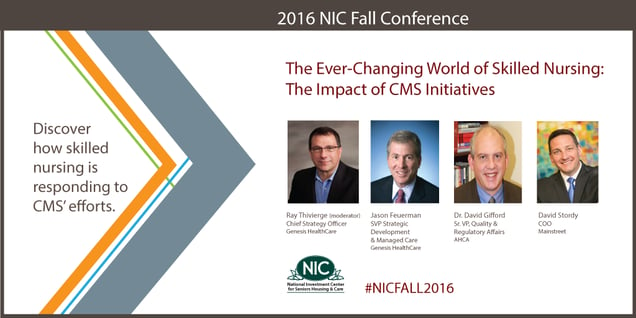
The challenge facing the skilled nursing sector, Ray Thivierge explained during a recent interview with NIC, is that a massive realignment is taking place as the health care system shifts from a fee-for-service to value-based reimbursements.
“Operators need to get their heads out of the sand,” Thivierge, chief strategy officer at Genesis HealthCare, said in remarks previewing a panel discussion he’ll moderate at the 2016 NIC Fall Conference, September 14-16, in downtown Washington, DC. “Concrete strategies are essential to deal with the changes.”
NIC spoke in advance with Thivierge, and three other panelists, to highlight what conference attendees can expect to learn at the session: “The Ever-Changing World of Skilled Nursing: The Impact of CMS Initiatives.”
Panelists said the session will emphasize the importance of embracing the new reality of value-based reimbursements. The session will also provide innovative approaches to help navigate the emerging environment that focuses on better care, at a lower cost.
“We are moving quickly to a system with payments tied directly to quality outcomes,” said panelist David Stordy, chief operating officer, Mainstreet, a developer and operator of rehabilitation facilities. The fallout will be dramatic as payors seek to reduce the length of stay in skilled nursing and post-acute settings, or skip that step altogether and send patients directly home. Payors are also looking to control the rehospitalization of patients.
As a result, skilled nursing providers need to manage the length of post-acute stays and decrease hospital readmission rates in order to get referrals, commented panelist Jason Feuerman, senior vice president-strategic development and managed care at Genesis HealthCare. “What we’re seeing is unprecedented.”
Transitions of care will continue to play a pivotal role as providers are held responsible for patient outcomes after discharge. “There’s a big focus on cost,” said panelist David Gifford, senior vice president for quality and regulatory affairs at the American Health Care Association.
Operating strategies to be covered at the NIC session include:
- Weighing whether to focus only on short-stay rehabilitation or long-term care. Panelists predict that the skilled nursing sector may bifurcate into two separate businesses.
- Gaining share by concentrating on specialized treatments, such as for orthopedic patients, or those with dementia.
- Repositioning a facility to capitalize on narrowed referral networks. “You have to know referral partners,” said panelist Feuerman, adding that the Five-Star Quality Rating System developed by CMS will continue to play a pivotal role in referrals.
- Recapturing costs from the system by participating in Medicare Shared Savings programs.
- Recognizing the importance of a data strategy to track outcomes, by diagnosis. Providers must be able to manage information to demonstrate value to payors and networks.
- Holding the line on costs.
- Creating organizational systems that emphasize care practices and empower the staff to solve problems. Providers with high employee turnover and weak management will not succeed, said panelist Gifford.
The ramifications of the health care system changes will be felt by investors too, panelists agreed. Historical data on rents and occupancies have been used to derive the future value of a building or enterprise, said panel moderator Thivierge. But, he added, “Those valuation processes are breaking down.” Thivierge predicts that investors will face some near term uncertainty as new valuation models emerge. “Providers cannot yet provide the level of transparency needed to evaluate an enterprise five years from now,” he said.
One Week Left to Save on Registration
The early bird discount for 2016 NIC Fall Conference registration ends July 20. Take action today to save your spot.
About NIC
The National Investment Center for Seniors Housing & Care (NIC) is a nonprofit 501(c)(3) organization whose mission is to support access and choice for America’s seniors by providing data, analytics, and connections that bring together investors and providers.
Connect with NIC
Read More by NIC